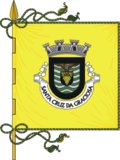Santa Cruz da Graciosa
| Santa Cruz da Graciosa | |||
| Municipality (Concelho) | |||
|
The municipal seat of Santa Cruz da Graciosa, as seen from off the northeast coast of the island of Graciosa
|
|||
|
|||
| Official name: Concelho de Santa Cruz das Flores | |||
| Name origin: santa cruz, Portuguese for holy cross; literally Holy Cross of Graciosa | |||
| Country | |||
|---|---|---|---|
| Autonomous Region | |||
| Island | Graciosa | ||
| Civil Parishes | Guadalupe, Luz, Santa Cruz da Graciosa, Praia | ||
| Center | Santa Cruz da Graciosa | ||
| - elevation | 140 m (459 ft) | ||
| - coordinates | 39°3′17″N 28°0′51″W / 39.05472°N 28.01417°WCoordinates: 39°3′17″N 28°0′51″W / 39.05472°N 28.01417°W | ||
| Highest point | Caldeira | ||
| - elevation | 405 m (1,329 ft) | ||
| - coordinates | 39°1′15″N 27°58′2″W / 39.02083°N 27.96722°W | ||
| Lowest point | Sea level | ||
| - location | Atlantic Ocean | ||
| - elevation | 0 m (0 ft) | ||
| Area | 60.66 km2 (23 sq mi) | ||
| - water | .015 km2 (0 sq mi) | ||
| - urban | 3.63 km2 (1 sq mi) | ||
| Population | 4,391 (2011) | ||
| Density | 72/km2 (186/sq mi) | ||
| Settlement | c.1475 | ||
| - Municipality | c.1832 | ||
| LAU | Câmara Municipal | ||
| - location | Largo Vasco da Gama | ||
| - elevation | 7 m (23 ft) | ||
| - coordinates | 39°5′9″N 28°0′20″W / 39.08583°N 28.00556°W | ||
| President | Manuel Avelar Cunha Santos (PS) | ||
| Municipal Chair | João Manuel Bettencourt Cunha (PPD/PSD) | ||
| Timezone | Azores (UTC-1) | ||
| - summer (DST) | Azores (UTC0) | ||
| Postal Zone | 9880-352 | ||
| Area Code & Prefix | (+351) 292 XXX XXX | ||
| Demonym | Santa-cruzense | ||
| Municipal Holidays | 2nd Monday in August | ||
|
Location of the municipality of Santa Cruz da Graciosa in the archipelago of the Azores
|
|||
| Website: http://cm-graciosa.azoresdigital.pt/ | |||
| Statistics from INE (2001); geographic detail from Instituto Geográfico Português (2010) | |||
Santa Cruz da Graciosa (Portuguese pronunciation: [ˈsɐ̃tɐ ˈkɾuʒ ðɐ ɣɾɐsiˈɔzɐ]) is a Portuguese municipality on the island of Graciosa, in the archipelago of the Azores. The population in 2011 was 4,391, in an area of 60.66 km². It includes four local parishes and one municipal government structure, which administers the entire island.
While the date of its first discovery is uncertain, it is known that its first settlers arrived from the island of Terceira around 1450. One of the first settlers was Vasco Gil Sodre.
The early settlement was primarily agrarian, but by 1486 its population had grown sufficiently to warrant the founding of the vila (or town) of Santa Cruz in 1486, while Praia lost this role.
Between the 16th-17th century, Graciosa was regularly attacked by pirates and privateers, which obliged the local government to construct fortifications along the island's coast for defense.
Over the centuries Santa Cruz was visited by important travellers. The Jesuit António Vieira, who stopped in the village after a shipwreck while returning to Lisbon from Brazil. Later the French writer Chateaubrian, in 1791, whilst fleeing the horrors of the French Revolution stopped in Graciosa en route to America. In 1814, a young Almeida Garret wrote some of his first verses, already a revelation of his budding talents. Finally, in 1879, Prince Albert of Monaco, notable for his oceanographic and maritime studies, stopped in Graciosa and visited Furna do Enxofre. He was one of the first to descend the volcanic chamber using a rope ladder.
The construction of the port in Praia, and the northern aerodrome, were important in breaking the island's isolation and concentration on agriculture.
The territory of Graciosa Island consists of one municipality, Santa Cruz da Graciosa (4,780 inhabitants in 2001), which is divided into four civil parishes:
The population centers on the island, apart from appearing dispersed, are concentrated along the road network. This is typical of many of other Azorean islands, usually colonized along important corridors corresponding to river-valleys or open terrains. Consequently, urban development has been conditioned by the islands geomorphology resulting in four principal axes of settlement supporting 80% of the islands population:
...
Wikipedia




